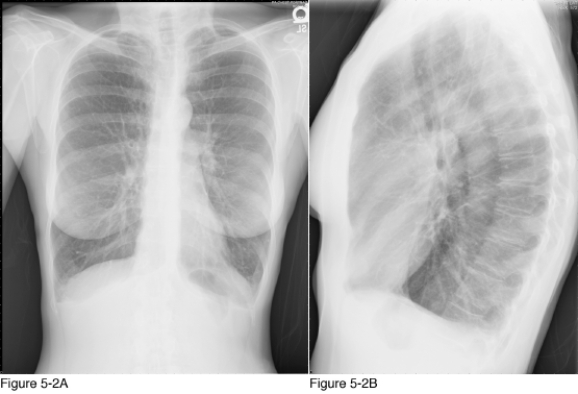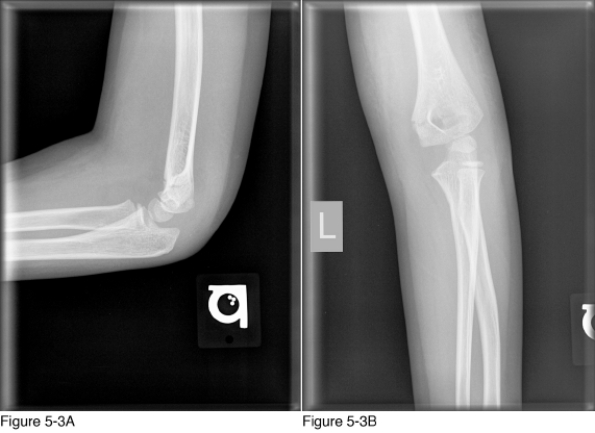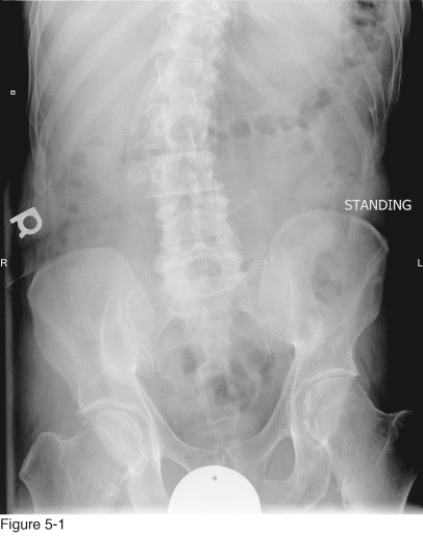Deck 5: Film Interpretation and Report Writing
Question
Question
Question
Question
Question
Question
Question
Question
Question
Question
Question
Question
Question
Question
Question
Question
Question
Question
Question

Unlock Deck
Sign up to unlock the cards in this deck!
Unlock Deck
Unlock Deck
1/19
Play
Full screen (f)
Deck 5: Film Interpretation and Report Writing
1

The major finding in the radiographs in Figure 5-2 is __________.
A) lung hyperinflation
B) accentuated pulmonary interstitial
C) cardiomegaly
D) decreased bone density
lung hyperinflation
2

Which section of the ABCS (alignment, bone, cartilage, soft tissue) should be addressed first in the radiology report for the radiographs in Figure 5-2?
A) Alignment
B) Bone
C) Cartilage
D) Soft tissue
Soft tissue
3
Which of the following is not a clinical red flag for serious spinal pathology?
A) Short-term corticosteroid use
B) Age older than 50 years
C) Urinary retention
D) Pain that worsens when the patient is lying down
A) Short-term corticosteroid use
B) Age older than 50 years
C) Urinary retention
D) Pain that worsens when the patient is lying down
Short-term corticosteroid use
4

Follow-up diagnostic ultrasound evaluation of the abnormality in Figure 5-4 would localize the lesion to the __________.
A) ureter
B) ovary
C) sacral
D) uterus

Unlock Deck
Unlock for access to all 19 flashcards in this deck.
Unlock Deck
k this deck
5

The majority of the pertinent findings in Figure 5-1 would be described in which paragraph of the radiology report?
A)Alignment
B)Bone
C)Cartilage
D)Soft tissue

Unlock Deck
Unlock for access to all 19 flashcards in this deck.
Unlock Deck
k this deck
6

Which of the following is the most important diagnosis to report in the impression section of the report on the image in Figure 5-1?
A) Healed slipped capital femoral epiphysis
B) Osteoarthritis of the hips
C) Hereditary multiple exostosis
D) Lumbar degenerative disc disease

Unlock Deck
Unlock for access to all 19 flashcards in this deck.
Unlock Deck
k this deck
7

Failure to produce a radiology report on radiology services that were billed globally (for both technical and interpretation compliance) constitutes __________.
A) appropriate patient care
B) class A misdemeanor
C) felony
D) fraud

Unlock Deck
Unlock for access to all 19 flashcards in this deck.
Unlock Deck
k this deck
8

The radiographs in Figure 5-2 should be recorded on the radiology report as __________.
A) thoracic spine: anteroposterior (AP), lateral
B) thoracic spine: posteroanterior (PA), lateral
C) chest series: AP, lateral
D) chest series: PA, lateral

Unlock Deck
Unlock for access to all 19 flashcards in this deck.
Unlock Deck
k this deck
9

Which section of the radiology report is optional?
A) Demographics
B) Findings
C) Impressions
D) Recommendations

Unlock Deck
Unlock for access to all 19 flashcards in this deck.
Unlock Deck
k this deck
10

Which section of the radiology report should contain information on the patient's clinical complaint?
A) Demographics
B) History
C) Findings
D) Impressions

Unlock Deck
Unlock for access to all 19 flashcards in this deck.
Unlock Deck
k this deck
11

With which of the following conditions, evident in Figure 5-3, is using diagnostic terminology in the findings section appropriate?
A) Tumor
B) Fracture
C) Osteomyelitis
D) Arthritis

Unlock Deck
Unlock for access to all 19 flashcards in this deck.
Unlock Deck
k this deck
12

Lack of reporting of imaging studies may result in all of the following except __________.
A) repeated examinations
B) increased liability
C) loss of data regarding diagnoses
D) decreased risk of unnecessary repeated x-rays

Unlock Deck
Unlock for access to all 19 flashcards in this deck.
Unlock Deck
k this deck
13

A list of differential diagnoses in a radiology report should be limited to no more than __________ diagnoses to maintain relevance to the receiving doctor.
A) two
B) three
C) four
D) five

Unlock Deck
Unlock for access to all 19 flashcards in this deck.
Unlock Deck
k this deck
14

The radiographic density of the salient abnormality in Figure 5-4 is that of __________.
A) air
B) fat
C) bone
D) metal

Unlock Deck
Unlock for access to all 19 flashcards in this deck.
Unlock Deck
k this deck
15

According to Chapter 5, how should the findings section of the radiology report for this patient be formatted?
A) Bulleted
B) Number list
C) Grammatically correct paragraphs
D) Fragmented statements

Unlock Deck
Unlock for access to all 19 flashcards in this deck.
Unlock Deck
k this deck
16

Normal findings that disprove the presence of an abnormality for which an examination was ordered are known as __________.
A) conclusions
B) pertinent negatives
C) normal statements
D) liability limiters

Unlock Deck
Unlock for access to all 19 flashcards in this deck.
Unlock Deck
k this deck
17

Patients with this condition should be advised to seek reexamination if there is development of unexplained bone pain due to concern for increased possibility of __________.
A) avascular necrosis
B) crystal deposition disease
C) myelopathy
D) malignant degeneration

Unlock Deck
Unlock for access to all 19 flashcards in this deck.
Unlock Deck
k this deck
18

The etiology of the disease represented in Figure 5-1 is __________.
A) genetic
B) infectious
C) posttraumatic
D) metastatic

Unlock Deck
Unlock for access to all 19 flashcards in this deck.
Unlock Deck
k this deck
19

The five radiographic densities in order from least to most dense are __________.
A) air, water, fat, bone, and metal
B) fat, water, air, bone, and metal
C) air, fat, water, bone, and metal
D) bone, metal, water, fat, and air

Unlock Deck
Unlock for access to all 19 flashcards in this deck.
Unlock Deck
k this deck


